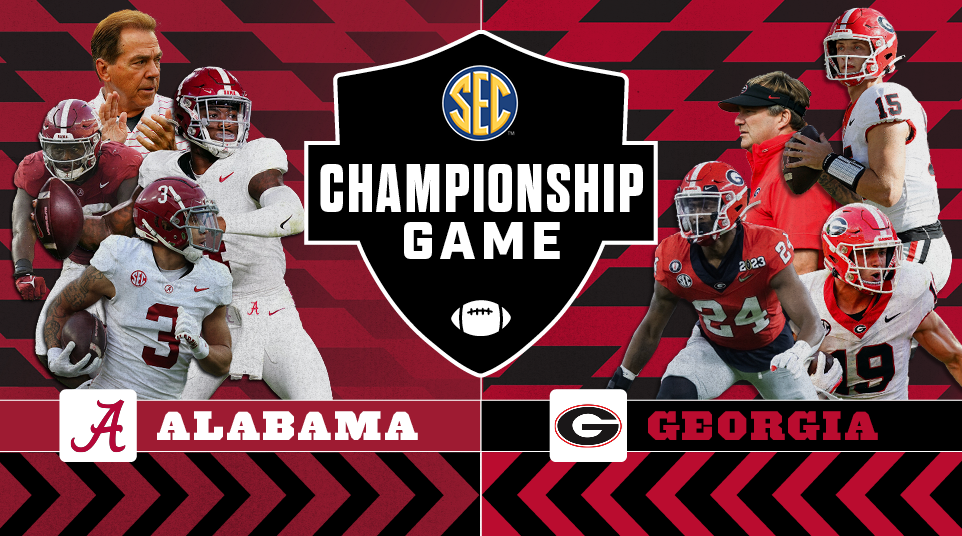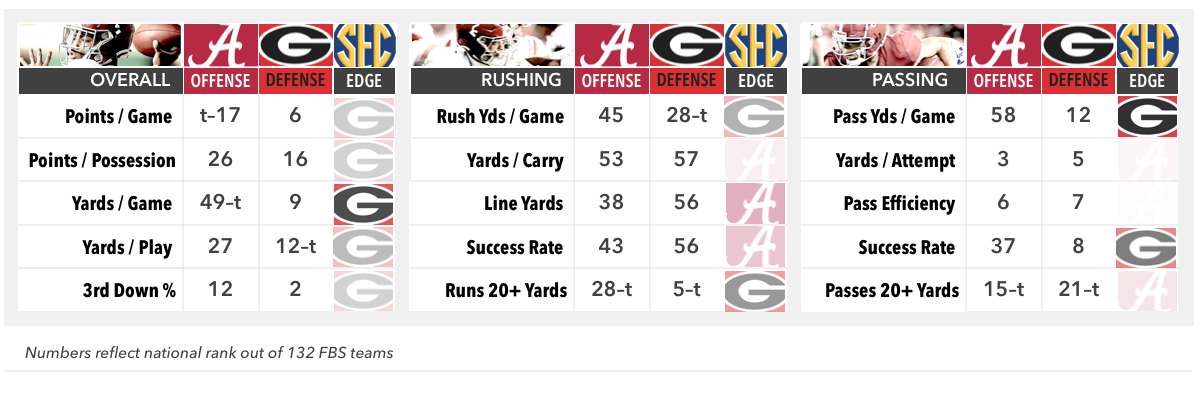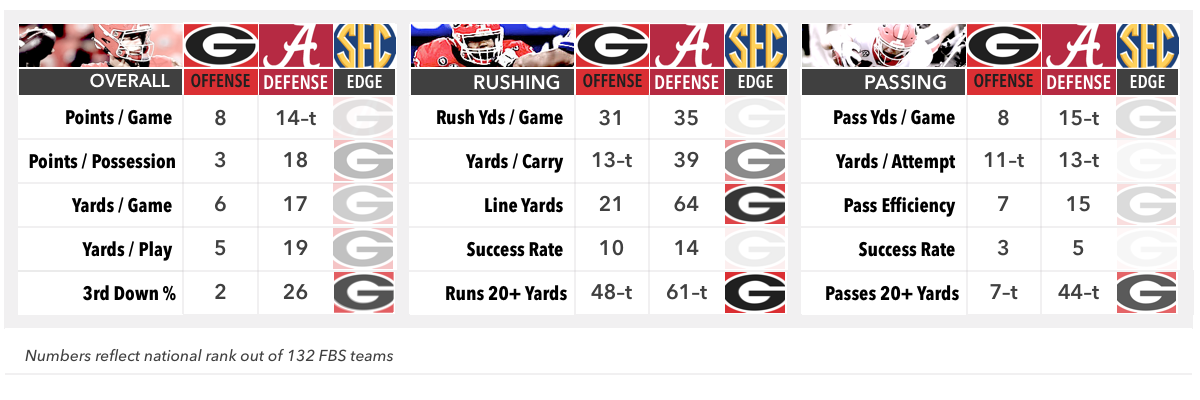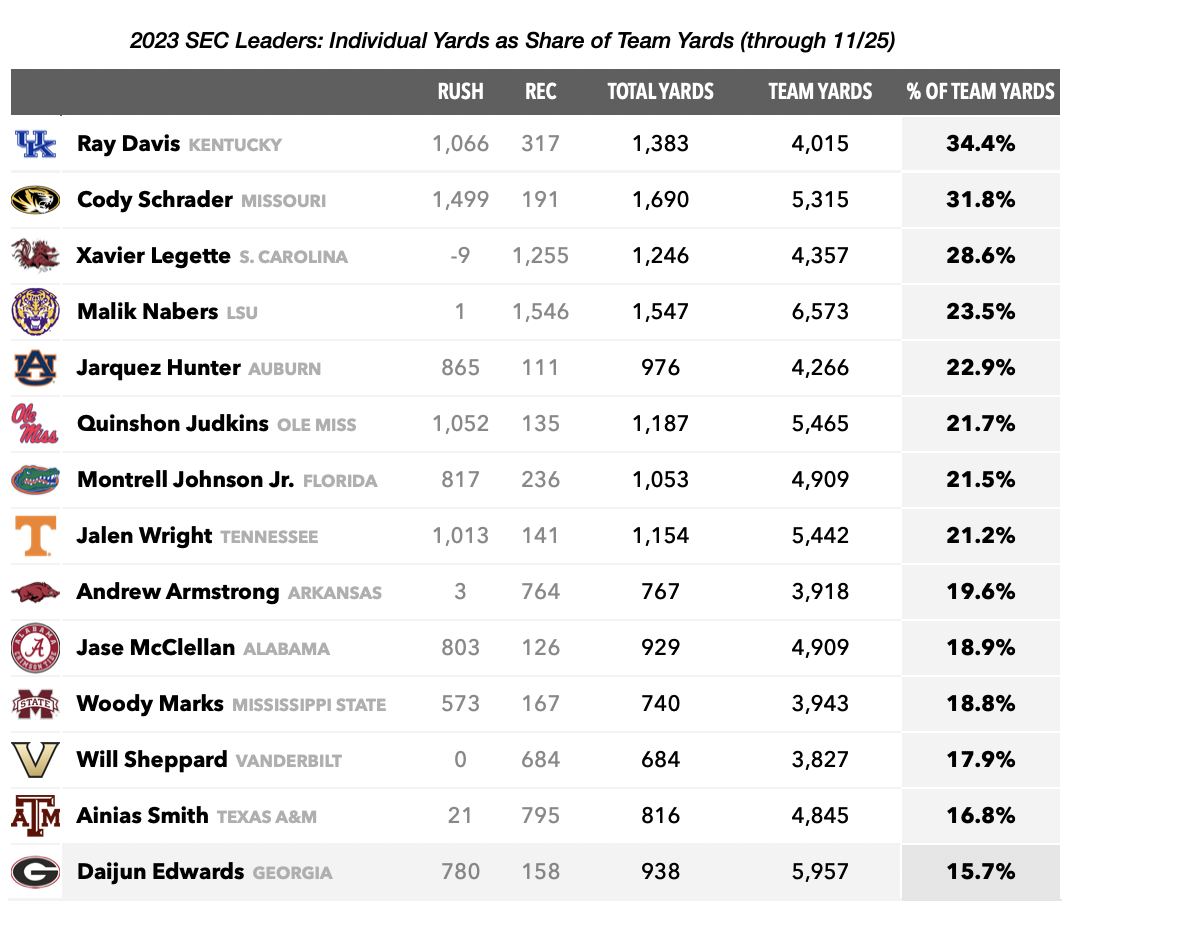
SDS' Ultimate SEC Championship Primer: Alabama and Georgia ring out the winner-take-all era. Will the stakes ever be as high again?
Everything you need to know about Saturday’s SEC Championship clash between Georgia (-6.5) and Alabama.
– – –
The 32nd edition of the SEC Championship Game marks the end of an era — multiple eras, in fact. Saturday’s tilt will be the final collision between East and West, which will cease to exist when the conference drops the two-division format next year; the last meeting under the current 14-team configuration, before Oklahoma and Texas expand the rolls to 16; and, for the foreseeable future, the last SEC game on CBS, which has broadcast every SEC Championship Game since 2001, and which has played an indispensable role in the conference’s growth from a regional league to a billion-dollar national brand. No matter how you feel about Gary Danielson, there is no S-E-C! without “The SEC on CBS.”
Looking ahead to the next era, it’s also going to be the last iteration of the event that feels BIG in the way we’ve come to understand it. Not that it’s possible to imagine such a thing as a low-stakes SEC Championship Game. The stakes in Atlanta are always high, and as always when the league’s reigning overlords are involved the urgency is dialed up to 11. Bama-Georgia: In any context, as big as it gets. In the context of this specific matchup, it’s a must-win affair. Both teams’ seasons are riding on it, as well as their sense of place within the sport’s broader pecking order.
Georgia, owner of back-to-back national titles and an SEC-record 29-game winning streak, must win to reinforce its supremacy in the polls and carry its bid for a 3-peat one giant step closer to fruition. Unlike the past 2 years, the Bulldogs do not have enough of a cushion over the rest of the Playoff field to take for granted that a CFP slot will be waiting for them should they lose. (An uninspired nonconference schedule does them no favors there.) Barring an unlikely combination of upsets across the country, a loss on Saturday will almost certainly leave the defending champs out in the cold.
Alabama, winner of 10 straight since its Week 2 wake-up call against Texas, must win to have any chance of returning to the Playoff with a loss on its résumé, or to preserve its fading but still more-or-less coequal status with Georgia as a gold-standard program. A big part of the panic that followed the loss to the Longhorns was an undercurrent of decline: Coming off an underachieving season in 2022, the Tide were suddenly on the brink of missing the championship cut 2 years in a row for the first time under Nick Saban, a streak that spans the entire Playoff era as well as the final years of the BCS. It took half the season for the ’23 team to start looking like an outfit that could pass for vintage Bama, and a hair-raising comeback in the Iron Bowl to keep it all from slipping away.
TOUCHDOWN ALABAMA ON 4TH AND A MILE!
UNREAL! pic.twitter.com/rX5XPRsuzV
— CBS Sports (@CBSSports) November 26, 2023
Still, here they are: In control of their fate, with all of their goals intact and one shot at redefining a vexing campaign as a triumph. Who back in September actually dared to doubt the Tide?
By any definition, this is a BIG game. Take a moment or two on Saturday to appreciate it, because beginning next year the stakes will rarely if ever be as high again anytime soon. Between the expansion of the CFP field from 4 teams to 12 and the elimination of divisions (thereby cutting off the path for a marginal contender to take advantage of the weaker half of the conference), the future of the SEC Championship Game is a stage for teams whose Playoff tickets, in most years, have already been punched.
Imagine this year’s matchup absent the winner-take-all backdrop. Still a heavyweight fight between college football’s most talented teams; still a test of two of college football’s greatest minds and egos in Nick Saban and his old protégé, Kirby Smart; still meaningful locally, in the way that only a 120-year-old border war can be; still relevant in the pursuit of a national title, with only the conference champion eligible for a first-round bye under the 12-team format. The trophy presentation would feel just as sweet, and the banner hung with just as much pride.
But it would not be definitive. A loss would not end Georgia’s bid for a 3-peat, or ensure Alabama’s existential crisis extended into the offseason. The cost of a defeat (beyond the angst that accompanies any defeat for teams that almost never lose) would amount to an extra hurdle to clear in the Playoff, rather than being knocked off the track altogether. The season and all the baggage that comes with it would not hang in the balance. It would just mean … well, less.
For those us in the pro-expansion camp, the tradeoff is worth it: More games that resonate in the Playoff race in exchange for the ones that resonate the most now losing a little bit of that clout. The SEC Championship, Ohio State-Michigan, the surprise undefeated team vying to preserve its perfect record in a tough road game in miserable conditions in mid-November – they’ll still matter, but the voltage will be dialed back a notch or two so the heat can be more evenly dispersed. Many other games, and conference championship games, especially, will mean more. The expanded Playoff itself is going to resonate louder than ever. In the meantime, though, that’s all the more reason to enjoy one more do-or-die blockbuster in Atlanta at full pressure, while we still can.
When Alabama has the ball …

The stat: 3.48 seconds
That’s Alabama QB Jalen Milroe‘s average time to throw this season, per Pro Football Focus, most among FBS quarterbacks with at least 150 drop-backs. Among SEC quarterbacks, that’s a full half-second more per drop-back than the 2nd-longest average, belonging to Arkansas’ KJ Jefferson (2.97 seconds), and more than a full second more than Georgia’s Carson Beck (2.37 seconds).
There are 3 explanations for that gap. One, despite initial concerns over the offensive line — and over true freshman left tackle Kadyn Proctor, specifically — the front has largely held up its end of the bargain over the course of the season. Since Alabama’s open date in Week 9, Milroe has been sacked just 4 times in the past 4 games, compared to 30 times in the previous 8. Two, like many young QBs, he’s been prone to holding on to the ball too long, a recurring complaint as his sack totals soared over the first half of the year. And 3, Milroe is supremely gifted at buying extra time with his legs. By PFF’s accounting, he’s accumulated more scramble yards on designed passes (473) than any other quarterback nationally except LSU’s Jayden Daniels.
Can Georgia speed him up? The Bulldogs don’t have a single standout pass rusher, a surprising void on a unit overstocked with blue-chip talent at every position. Their most productive player off the edge, sophomore Jalon Walker, is a situational rusher who averages about 15 snaps per game on defense. Then again, with an improvisational talent like Milroe, forcing him out of his comfort zone may be less about breathing down his neck than closing off the available escape routes.
The big question: Can Alabama hit the long ball?
The upshot of Milroe’s sandlot style is that, for all his inconsistency, he’s as dangerous as any quarterback in the country throwing downfield. He is aggressive and efficient. On throws of 20+ air yards, Milroe ranks 2nd nationally in completion percentage (55.2%), 2nd in yards per attempt (20.7), and 3rd in touchdowns (15), per PFF. He has more completions of 25+ yards this year (35) than Bryce Young had last year (33) on significantly more attempts, including at least one 40-yard connection in every game but one.
Throw it DEEP!!!
Milroe ➡️ Burton?: CBS pic.twitter.com/aUlWmZFmuu
— Alabama Football (@AlabamaFTBL) September 23, 2023
Georgia, predictably, is on the opposite end of the spectrum when it comes to giving up big gains: The Bulldogs have allowed 29 completions of 20+ yards, fewest in the SEC, and just 3 of 40+ yards, among the fewest in the nation. Only one opposing QB, Missouri’s Brady Cook, has managed any kind of sustained downfield success, going 4-for-8 for 126 yards on attempts of 20+ yards in Week 10 in a 30-21 loss in Athens.
GOING DEEP ?@MizzouFootball leads early vs. the defending champs ? pic.twitter.com/SW8zKJXoyK
— CBS Sports (@CBSSports) November 4, 2023
Then again, that was the only real damage the electric Luther Burden III managed to inflict in that game, and even that was more than the rest of the league combined. In Georgia’s other 7 SEC games, opposing quarterbacks were a combined 6-for-35 on 20+ yard attempts with zero touchdowns.
The key matchup: Alabama WR Isaiah Bond vs. Georgia DB Tykee Smith
Bond, a true sophomore, etched his name in Alabama history with his game-winning catch at Auburn. If the Crimson Tide go on to win a national championship, school children in the Bama half of the state will learn about 4th-and-31 in textbooks. Before the rest of the country learned his name, though, Bond had already carved out a niche as Milroe’s go-to target out of the slot, and ended the regular season as the team leader in targets (64) and receptions (40). While Jermaine Burton and Kobe Prentice stretched the field, Bond has served as a security blanket, with the majority of his catches coming within 9 yards of the sticks.
Smith, a 5th-year transfer from West Virginia, finally carved out a full-time role this season after spending the previous two years battling injuries. Manning the nickel role (“Star,” in local parlance), he’s done a little bit of everything, ending the regular season as the team leader in total tackles (63), tackles for loss (7.5), and interceptions (4).
Handling Smith’s physicality will be as much of a challenge for Bond as handling Bond’s quickness in space will be for Smith. If Bond manages to create separation, though, it could be a big play waiting to happen: PFF has dinged Smith for allowing three touchdowns in coverage.
When Georgia has the ball …

The stat: 15.7%
That’s Georgia RB Daijun Edwards‘s share of the Bulldogs’ total yards from scrimmage this season, the highest share on the team and the lowest in the SEC for a team leader. As usual, no offense relied less on an individual player for its overall output:

The egalitarian approach was a hallmark of Georgia’s offense under former coordinator Todd Monken (currently overseeing one of the NFL’s most productive offenses as OC of the Baltimore Ravens) and his successor, Mike Bobo, has followed suit with gusto. The Bulldogs rank 6th nationally in total offense and 8th in scoring without a single individual player in the top 10 in the SEC in yards from scrimmage. Only one, Edwards, even cracks the top 25.
Instead, they spread the wealth as thinly as possible across a two-deep that legitimately features 10 players who figure into the regular rotation at the skill positions. Edwards shares touches in the backfield with Kendall Milton, who has rebounded form nagging knee and hamstring injuries to turn his best 3 games of the season over the past 3 weeks; together, they’ve accounted for more than 1,600 yards and 21 touchdowns. Seven players have at least 20 receptions on the year; only two, TE Brock Bowers and Missouri transfer Dominic Lovett, have more than 30.
The distribution does change from week to week depending on who’s healthy, who’s open, and who’s in the doghouse. (Georgia’s health on offense is a significant question mark; see below.) The would-be headliners have taken turns sharing the spotlight. Edwards has accounted for 100+ yards 4 times; Bowers 3 times; Milton twice; and WRs Ladd McConkey and Marcus Rosemy-Jacksaint once apiece. Altogether, that comes out to 11 individual triple-digit performances by 5 different players in 9 different games. Any of them are capable of going off at any given time, and Alabama must be prepared to account for all of them all afternoon long.
The big question: Can Alabama’s pass rush get to Carson Beck?
Beck, like Stetson Bennett IV before him, is arguably the best protected quarterback in America. Per PFF, he’s faced pressure on just 16.3% of his total drop-backs this season, the 2nd-lowest rate among all FBS starters behind Oregon’s Bo Nix (15.5%). Sack-wise, opposing pass rushers have been shut out in 8 of 12 games, including each of the past 3 since starting RT Amarius Mims returned to the lineup from an ankle injury.
Beck himself deserves credit on that front, with his advanced decision-making and quick release contributing to his own self-preservation. But few QBs anywhere have the benefit of operating from more reliably pristine pockets.
If there’s any pass rush in the college game capable of disrupting his cozy existence, it’s Bama’s. When the Tide lost Will Anderson Jr. to the NFL Draft, two more NFL-ready edge types grew in his place: Former 5-stars Dallas Turner and Chris Braswell have lived up to the billing, emerging from Anderson’s shadow to form the nation’s most feared set of bookends. PFF credits them with 99 combined QB pressures and 22 sacks, both tops among any pair of SEC teammates, as well as 5 forced fumbles.
Big Time Players make BIG Time Plays?
? CBS pic.twitter.com/oh49AbRlZy
— Alabama Football (@AlabamaFTBL) October 21, 2023
Individually, Turner and Braswell each commands attention in his own right; together, they have the potential to wreck a game plan and make a typically efficient passer like Beck look like he’s lost the thread. Their reps opposite Georgia’s enormous, equally touted offensive tackles, Mims and Earnest Greene III, will have scouts’ full attention.
The key matchup: Georgia C Sedrick Van Pran vs. Alabama DL Tim Keenan III
With next-level talent all over the field, the battle on the interior line may not be the splashiest. At heart, though, both programs are built for trench war. Van Pran, the “runt” of Georgia’s front at a mere 6-4, 310 pounds, has started 42 consecutive games in the middle, boasts the highest overall PFF grade of any SEC center this season, and is widely regarded as the No. 1 center in next year’s draft.
Keenan, a true nose at 6-2/315*, emerged from a crowded depth chart early in the season and has been a mainstay as Bama’s primary run plugger. (*That’s Keenan’s listed weight according to his most recent team bio; last year he was listed at north of 340, and is probably a lot closer to that number than the official one.) Their initial collisions will settle one of the game’s most crucial variables — can Georgia establish the run? — and from there will go a long way toward dictating just how much of the Bulldogs’ playbook is at their disposal as the game wears on.
Special teams, injuries and other vageries
The injury situation is fluid but potentially significant, especially for Georgia. Four regulars on offense sat out last week’s 31-23 win over Georgia Tech with what were considered relatively minor aches and pains, including Brock Bowers, who’d handled a full workload in each of the previous two games on a surgically repaired ankle. Kirby Smart, however, insisted this week that the injuries are real, and that Bowers, Ladd McConkey, WR RaRa Thomas, and OL Tate Ratledge all remain in doubt for Saturday. “It bothers me that people have said out there that we sat these guys for the last game,” Smart told reporters on Thursday. “That wasn’t the case at all. They couldn’t go, and I don’t know if they’re going to be able to go in this game.”
Gamesmanship? We’ll find out Saturday. With respect to McConkey, Thomas, and Ratledge — a legitimate All-American candidate up front — Bowers is the one player on the team who can justifiably be described as irreplaceable. As committed as Georgia is to keeping all of its weapons involved, there’s little doubt when Bowers is on the field who is first among equals. Even against the likes of Alabama, his presence poses matchup problems that require the defense’s full attention, creating more space for UGA’s other receivers. And of course, being aware of the problem is not the same thing as having an answer for it.
Brock Bowers is a playmaker pic.twitter.com/Z7MyJmHJ3K
— CBS Sports College Football ? (@CBSSportsCFB) December 5, 2021
If Bowers can go anywhere near full-speed, it’s hard to imagine him not giving it a shot on this stage. In this game, that guy would be missed.
On Alabama’s side, the Crimson Tide are sweating out the availability of leading rusher Jase McClellan, who left the Iron Bowl with a foot injury and is “questionable” for Saturday, according to Saban. Bama is not nearly as dependent on its ground game as it has been in the past, but in addition to being a reliable playmaker with the ball in his hands McClellan’s experience is also an asset in pass protection. Behind him, Roydell Williams and true freshman Jam Miller are next in line.
Alabama’s kicking game falls on the mostly reliable leg of senior Will Reichard, the leading scorer in SEC history, who made his first 15 field goal attempts of the season before missing 3 of his past 6, all from between 40 and 49 yards. There’s no doubt about Reichard’s ability to connect from long distance — he’s 8-for-11 career from 50+ yards out — but he is in a minor funk and Alabama fans can never trust a kicker in a big game, anyway. Georgia’s Peyton Woodring, a true freshman, doesn’t have Reichard’s track record, but he has been a perfectly cromulent 20-for-23 on the season, including 4-for-5 from between 40-49 yards. He’s yet to attempt one from beyond 50.
Georgia return man Mekhi Mews won over the fan base early in the year with a 69-yard punt return for a touchdown against Ball State, but hasn’t broken one since while muffing 3. Alabama’s primary punt returner for most of the season, Kool-Aid McKinstry also has 3 muffs on the year; he’s since ceded the duties to true freshman Caleb Downs, whose took his first career return 85 yards to the house against Chattanooga.
85 YARD TO THE ??@caleb_downs2
? ESPN+ pic.twitter.com/W02mgLfJX9
— Alabama Football (@AlabamaFTBL) November 18, 2023
Downs is a rising star, for sure, but don’t hold your breath for lightning to strike twice: Georgia punter Brett Thorson has not allowed a single return all season, forcing 18 fair catches on 27 attempts.
The verdict
Alabama is rarely an underdog, to say the least. Saturday will mark just the 4th game in 14 years the Crimson Tide are not favored to win, and if the 6.5-point spread holds it will be the most lopsided line they’ve faced as dogs since the 2009 SEC Championship Game against Florida, when they were +10. (They won that one outright, as you may recall.)
Bama was +6 against Georgia in the 2021 SEC Championship Game (another memorable Bama win), and +3 in the CFP rematch a month later (score that one for the Bulldogs). Prior to that, the last time the Tide were on the wrong side of a point spread was an October 2015 trip to Athens, where they won big as 1.5-point dogs behind a breakout game from Derrick Henry. Kirby Smart left Tuscaloosa for his alma mater 2 months later.
Having been around for all that, though, this strikes me as the first time since at least the ’09 “Tebow Cried” game that Alabama really feels like an underdog. The Tide aren’t dominant in any single area, haven’t played a complete game on both sides of the ball, and have had more close calls than cruises. The offense fell short of 30 points in 6 of 9 games vs. Power 5 opponents — excluding a defensive touchdown against Tennessee — and the defense had its worst nights against the 2 best offenses it faced, Texas and LSU. With the exception of a Week 11 blowout at Kentucky, they’ve done more surviving than thriving, a theme that reemerged last week in their skin-of-the-teeth escape at Auburn.
For its part, Georgia hasn’t exactly blown the doors off the competition on a weekly basis, either. Over the first half of the season the Bulldogs gave off the impression of a team just going through the motions, including a couple of flat outings against South Carolina and Auburn. But at no point was their winning streak in real danger, and since their open date in Week 8 they’ve had a taste for blood, making quick work of Florida, Ole Miss, and Tennessee.
When the Dawgs go for the jugular, they look like what their reputation, their record, and their ranking says they are: The best team in the country. If this particular version of Alabama is capable of proving otherwise, it will have to show the rest of the world a side we have yet to see.
– – –
Georgia 27 | • Alabama 23
Scoreboard
Week 13 record: 8-1 straight-up | 5-4 vs. spread
Season record: 75-16 straight-up | 46-43-1 vs. spread
• • •
